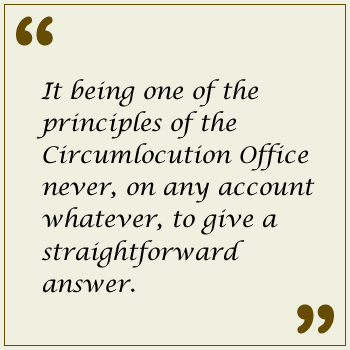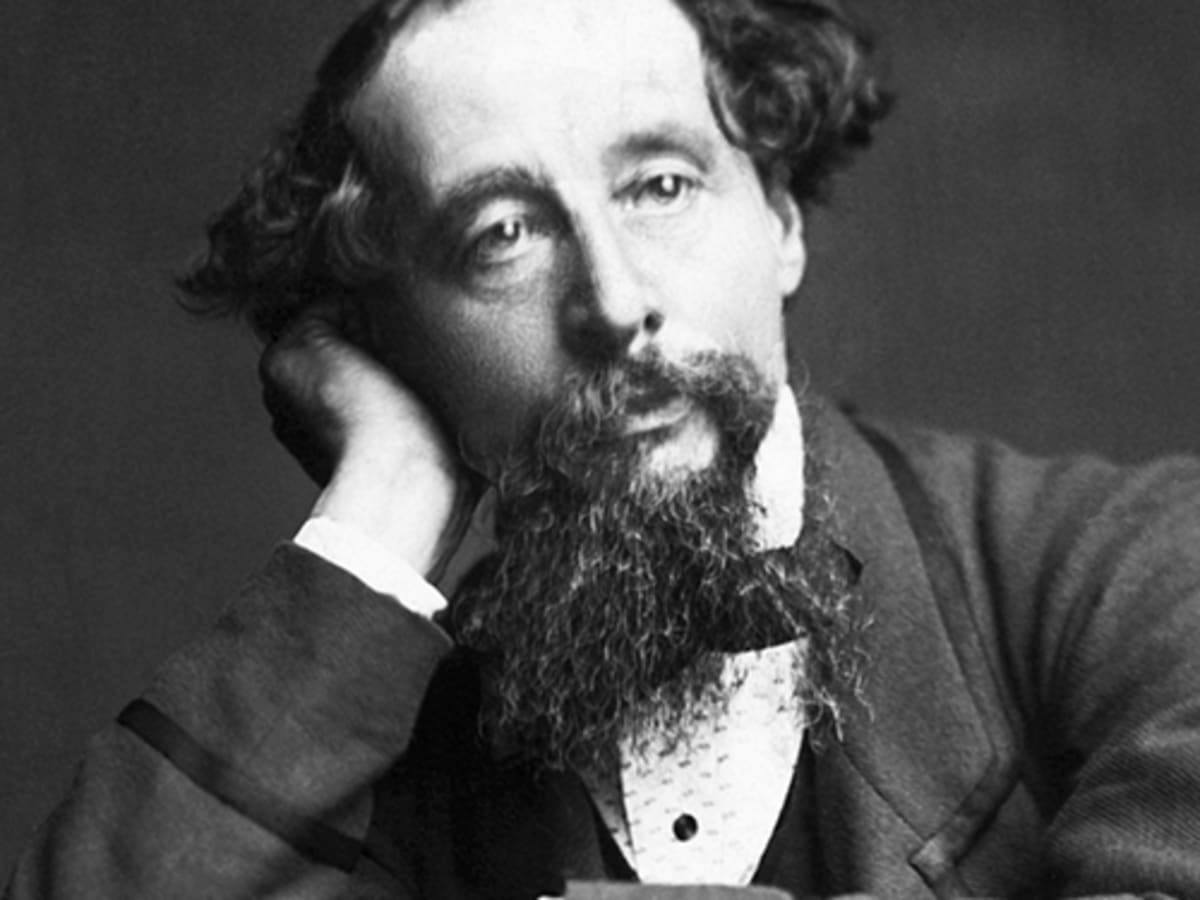As I may have stated here on one or two occasions, I consider Chas Dickens (born on this date in 1812) the greatest novelist in the English language. Yes, you all know of such as David Copperfield, Great Expectations, Oliver Twist and A Tale of Two Cities, but the real comic mastery unfolded in later Bleak House, Our Mutual Friend, Hard Times, and Little Dorrit. (See also the PBS series for Bleak House, one of best ever aired on a screen.) Having just read Little Dorrit—while revisiting another fine PBS version starring young Claire Foy and youngish Matthew McFayden of Succession fame—I will recommend to you below Dickens’ famous sketch of The Circumlocution Office. In your mind you may let it stand for all government bureaucracy, the U.S. Congress, or the entire official American and Brit way of how not to do it. First a visit to said office from the Little Dorrit series. Enjoy, then subscrtibe, it’s still free.
The Circumlocution Office
The Circumlocution Office was (as everybody knows without being told) the most important Department under Government. No public business of any kind could possibly be done at any time without the acquiescence of the Circumlocution Office. Its finger was in the largest public pie, and in the smallest public tart. It was equally impossible to do the plainest right and to undo the plainest wrong without the express authority of the Circumlocution Office
This glorious establishment had been early in the field, when the one sublime principle involving the difficult art of governing a country was first distinctly revealed to statesmen. Whatever was required to be done, the Circumlocution Office was beforehand with all the public departments in the art of perceiving—how not to do it. Through this delicate perception, through the tact with which it invariably seized it, and through the genius with which it always acted on it, the Circumlocution Office had risen to over-top all the public departments; and the public condition had risen to be—what it was.
It is true that How not to do it was the great study and object of all public departments and professional politicians all round the Circumlocution Office. It is true that every new premier and every new government, coming in because they had upheld a certain thing as necessary to be done, were no sooner come in than they applied their utmost faculties to discovering How not to do it. It is true that from the moment when a general election was over, every returned man who had been raving on hustings because it hadn’t been done, and who had been asking the friends of the honorable gentleman in the opposite interest on pain of impeachment to tell him why it hadn’t been done, and who had been asserting that it must be done, and who had been pledging himself that it should be done, began to devise, How it was not to be done.
It is true that the debates of both Houses of Parliament the whole session through, uniformly tended to the protracted deliberation, How not to do it. It is true that the royal speech at the opening of such session virtually said, "My lords and gentlemen, you have a considerable stroke of work to do, and you will please to retire to your respective chambers, and discuss, How not to do it." It is true that the royal speech, at the close of such session, virtually said, "My lords and gentlemen, you have through several laborious months been considering with great loyalty and patriotism, How not to do it, and you have found out; and with the blessing of Providence upon the harvest (natural, not political), I now dismiss you. All this is true, but the Circumlocution Office went beyond it.
Because the Circumlocution Office went on mechanically, every day, keeping this wonderful, all-sufficient wheel of statesmanship, How not to do it, in motion. Because the Circumlocution Office was down upon any ill-advised public servant who was going to do it, or who appeared to be--by any surprising accident--in remote danger of doing it, a memorandum and a letter of instructions extinguished him. It was this spirit of national efficiency in the Circumlocution Office that had gradually led to its having something to do with everything. Natural philosophers, soldiers, sailors, petitioners, memorialists, people with grievances, people who wanted to prevent grievances, people who wanted to redress grievances, jobbing people, jobbed people, people who couldn’t get rewarded for merit, and people who couldn’t get punished for demerit, were all indiscriminately tucked up under the foolscap paper of the Circumlocution Office.
Numbers of people were lost in the Circumlocution Office. Unfortunates with wrongs, or with projects for the general welfare (and they had better have had wrongs at first), who in slow lapse of time and agony had passed safely through other public departments; who, according to rule, had been bullied in this, over-reached by that, and evaded by the other; then got referred at last to the Circumlocution Office, and never reappeared in the light of day. Boards sat upon them, secretaries minuted upon them, commissioners gabbled about them, clerks registered, entered, checked, and ticked them off, and they melted away. In short, all the business of the country went through the Circumlocution Office, except the business that never came out of it; and its name was Legion.
Sometimes, angry spirits attacked the Circumlocution Office. Sometimes, parliamentary questions were asked about it, and even parliamentary motions made or threatened about it by demagogues so low and ignorant as to hold that the real recipe of government was, How to do it. Then would the noble lord, or right honorable gentleman, in whose department it was to defend the Circumlocution Office, make a regular field-day of the occasion. Then would he come down to that house with a slap upon the table, and meet the honorable gentleman foot to foot. Then would he be there to tell that honorable gentleman that the Circumlocution Office not only was blameless in this matter, but was commendable in this matter, was extollable to the skies in this matter. Then would he be there to tell that honorable gentleman that it would have been more to his honor, more to his credit, more to his good taste, more to his good sense, more to half the dictionary of commonplaces, if he had left the Circumlocution Office alone, and never approached this matter.
One of two things always happened; namely, either that the Circumlocution Office had nothing to say and said it, or that it had something to say of which the noble lord, or right honorable gentleman, blundered one half and forgot the other.
Such a nursery of statesmen had the Department become in virtue of a long career of this nature, that several solemn lords had attained the reputation of being quite unearthly prodigies of business, solely from having practicd, How not to do it, as the head of the Circumlocution Office.
The Barnacle family had for some time helped to administer the Circumlocution Office. The Barnacles were a very high family, and a very large family. They were dispersed all over the public offices, and held all sorts of public places. Either the nation was under a load of obligation to the Barnacles, or the Barnacles were under a load of obligation to the nation. It was not quite unanimously settled which; the Barnacles having their opinion, the nation theirs.
The Mr. Tite Barnacle who at the period now in question usually coached or crammed the statesman at the head of the Circumlocution Office, was more flush of blood than money. As a Barnacle he had his place, which was a snug thing enough; and as a Barnacle he had of course put in his son Barnacle Junior in the office. But he had intermarried with a branch of the Stiltstalkings, who were also better endowed in a sanguineous point of view than with real or personal property.
For Mr. Tite Barnacle, Arthur Clennam made his fifth inquiry one day at the Circumlocution Office; having on previous occasions awaited that gentleman successively in a hall, a glass case, a waiting room, and a fire-proof passage where the Department seemed to keep its wind. On this occasion Mr. Barnacle was not engaged, as he had been before, with the noble prodigy at the head of the Department; but was absent. Barnacle Junior, however, was announced as a lesser star, yet visible above the office horizon.
With Barnacle Junior, he signified his desire to confer; and found that young gentleman singeing the calves of his legs at the parental fire, and supporting his spine against the mantel-shelf. It was a comfortable room, handsomely furnished in the higher official manner, the pervading smell of leather and mahogany, and a general bamboozling air of How not to do it….






What exquisite set design! That floor! you've made me want to watch that one (which BBC production is this version of *Little Dorritt*?). do you know the similar sequence in Soderbergh's Kafka? (there's no clip or i'd have posted it, but it's brilliant! A film that needs more love)